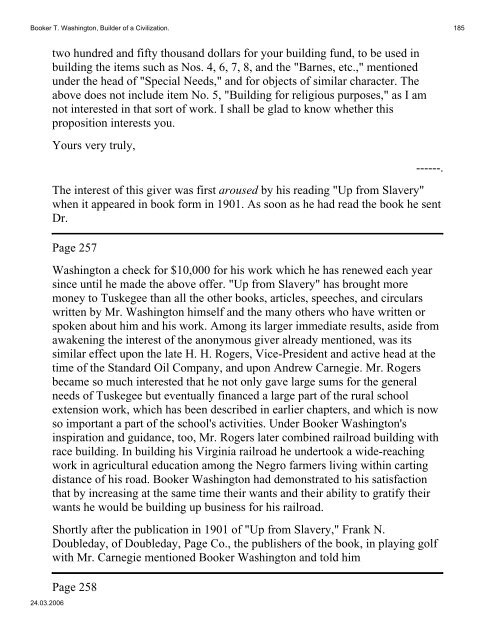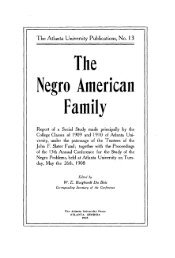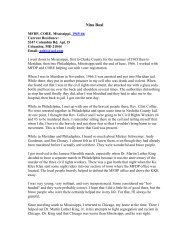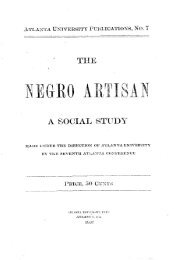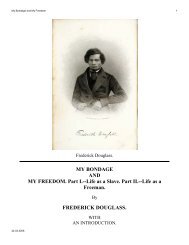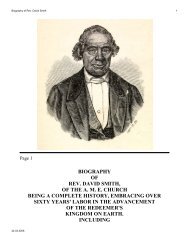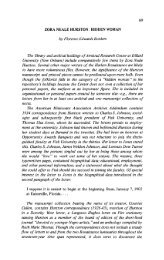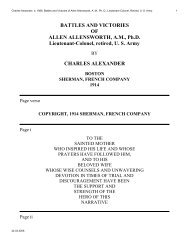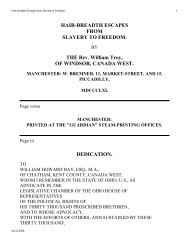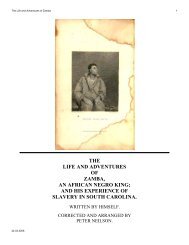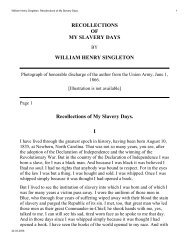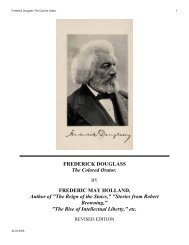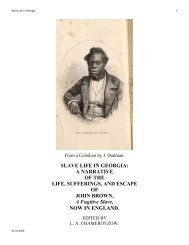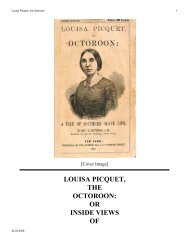Booker T. Washington, Builder o - African American History
Booker T. Washington, Builder o - African American History
Booker T. Washington, Builder o - African American History
You also want an ePaper? Increase the reach of your titles
YUMPU automatically turns print PDFs into web optimized ePapers that Google loves.
<strong>Booker</strong> T. <strong>Washington</strong>, <strong>Builder</strong> of a Civilization. 185<br />
24.03.2006<br />
two hundred and fifty thousand dollars for your building fund, to be used in<br />
building the items such as Nos. 4, 6, 7, 8, and the "Barnes, etc.," mentioned<br />
under the head of "Special Needs," and for objects of similar character. The<br />
above does not include item No. 5, "Building for religious purposes," as I am<br />
not interested in that sort of work. I shall be glad to know whether this<br />
proposition interests you.<br />
Yours very truly,<br />
------.<br />
The interest of this giver was first aroused by his reading "Up from Slavery"<br />
when it appeared in book form in 1901. As soon as he had read the book he sent<br />
Dr.<br />
Page 257<br />
<strong>Washington</strong> a check for $10,000 for his work which he has renewed each year<br />
since until he made the above offer. "Up from Slavery" has brought more<br />
money to Tuskegee than all the other books, articles, speeches, and circulars<br />
written by Mr. <strong>Washington</strong> himself and the many others who have written or<br />
spoken about him and his work. Among its larger immediate results, aside from<br />
awakening the interest of the anonymous giver already mentioned, was its<br />
similar effect upon the late H. H. Rogers, Vice-President and active head at the<br />
time of the Standard Oil Company, and upon Andrew Carnegie. Mr. Rogers<br />
became so much interested that he not only gave large sums for the general<br />
needs of Tuskegee but eventually financed a large part of the rural school<br />
extension work, which has been described in earlier chapters, and which is now<br />
so important a part of the school's activities. Under <strong>Booker</strong> <strong>Washington</strong>'s<br />
inspiration and guidance, too, Mr. Rogers later combined railroad building with<br />
race building. In building his Virginia railroad he undertook a wide-reaching<br />
work in agricultural education among the Negro farmers living within carting<br />
distance of his road. <strong>Booker</strong> <strong>Washington</strong> had demonstrated to his satisfaction<br />
that by increasing at the same time their wants and their ability to gratify their<br />
wants he would be building up business for his railroad.<br />
Shortly after the publication in 1901 of "Up from Slavery," Frank N.<br />
Doubleday, of Doubleday, Page Co., the publishers of the book, in playing golf<br />
with Mr. Carnegie mentioned <strong>Booker</strong> <strong>Washington</strong> and told him<br />
Page 258


